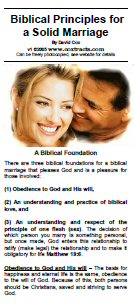Narcissism versus Love
Narcissism. By David Cox
[PC50] v1 ©2014 www.coxtracts.com
You may freely reproduce this tract for free distribution.
Narcissism. The “Narcissist” is a person who focuses his whole life on himself. This is Narcissism. In Mexico, we say “Me first, me last, and me in the middle”. Truthfully this is the type of person who literally adores and worships his own self, and doesn’t even know it. This is really spiritual worship, idolatry really, like what we are to do towards God, but the narcissist misdirects this back towards himself like Satan does. He thinks that he himself (or she herself) is of such great value, that the whole world should appreciate him for that greatness.
This attitude is greatly in conflict with what the Bible presents us in Jesus, which is our moral pattern. In Jesus’ character, we see humility, meekness, worry for others, service towards others, selflessness, and personal sacrifice for the benefit of others. The narcissist is a person that has captured the very essence of Satan’s personality and character, and is imitating it exactly. They are cruel, arrogant, egotistical, and the opposite all around of what a good Christian should be. Narcissism Continue reading









